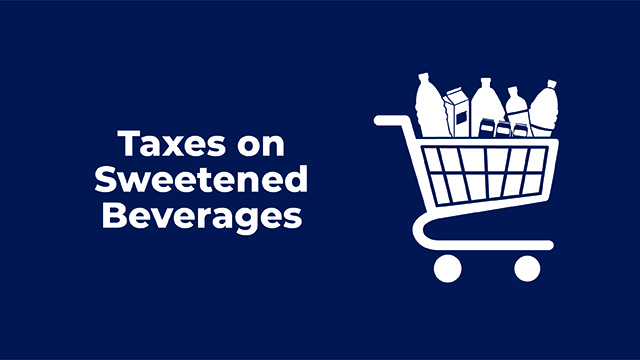New research reported in a National Bureau of Economic Research working paper finds that, after roughly one year, Philadelphia’s tax on sweetened beverages did not substantially reduce children’s consumption of such beverages overall. However, the tax did reduce the intake of added sugars from beverages for African American children and children who were the highest consumers of added sugars before the tax. The study—funded by the Robert Wood Johnson Foundation—also finds that adults reduced their consumption of regular soda, but not of sweetened beverages overall. In addition, the study examines beverage purchases, finding that Philadelphia residents increased their purchases of taxed beverages outside the city and reduced purchases in the city.
Last year, Philadelphia became only the second city in the United States to tax sugar-sweetened beverages (such as sodas, sweetened teas, and sports drinks) and the first to tax sweetened non-caloric beverages (such as diet sodas). Since then, a growing number of U.S. cities have enacted taxes on sweetened beverages to try to curb growing rates of obesity and diet-related chronic diseases, such as type 2 diabetes.
“The study determines how the tax has affected consumption among adults and children one year after implementation, with a particular focus on populations with relatively high rates of obesity,” said David Jones, one of the paper’s co-authors and a senior researcher at Mathematica Policy Research. “This is the first study to examine the impact of a beverage tax on children’s consumption in the U.S. and the first to examine impacts in Philadelphia beyond a few months.”
In 2016 and 2017, the authors interviewed consumers at stores in Philadelphia and comparison communities near the city about their beverage purchases before and after implementation of the tax. They also conducted a household survey of beverage consumption before and after the tax among adults and children living in Philadelphia and the same comparison communities.
Specific findings include the following:
- After the tax, shoppers decreased purchases of taxed beverages inside the city and increased purchases outside the city. The average amount of sweetened beverages purchased per shopping trip in Philadelphia fell by 8.9 ounces relative to the comparison communities, which is roughly equivalent to two fewer two-liter bottles per month.
- The percentage of Philadelphia residents reporting that their usual source of beverage purchases is outside the city increased by 17 percentage points, to roughly 33 percent.
- Among children overall, the tax did not have a substantial impact on consumption of sweetened beverages or intake of added sugars from beverages.
- For children who were high consumers of added sugars from beverages (the equivalent of a 20-ounce bottle of regular soda per day), the tax decreased consumption of added sugars by nearly 15 grams per day, or 22 percent.
- Among African American children—who have higher rates of sweetened beverage consumption and obesity nationally—the tax reduced consumption of added sugars from beverages by 8.0 grams per day, which translates to 32 fewer calories per day.
- For adults, the tax reduced consumption of regular soda by roughly one fewer 20-ounce soda every three days, but there was no detectable change in their consumption of other sweetened beverages or of added sugars from beverages overall.
- Among African American adults, the tax reduced the frequency of regular soda consumption by 14.6 times per month—the equivalent of nearly one fewer 20-ounce soda every other day.
“Although the tax did not reduce the consumption of sweetened beverages or the intake of added sugars from beverages among children overall, the tax did influence consumption among African American children and among children who were frequent consumers of sweetened beverages,” said David Frisvold, a study co-author and associate professor of economics at the University of Iowa. “If these results are sustained, the tax could reduce weight among African American children by two pounds and among previously frequent consumers of sweetened beverages by four pounds.”
John Cawley, study co-author and professor of economics at Cornell University, added, “A possible reason that we do not find a detectable impact of the Philadelphia beverage tax on either added sugars from beverages or the frequency of consuming sweetened beverages could be cross-border shopping. We observe that Philadelphia residents report shopping for beverages outside of the city more frequently, and those who do shop outside of the city are more likely to buy taxed beverages.”
The working paper is part of an ongoing, multi-city research study. Findings regarding the tax’s impact on prices and product availability are in a National Bureau of Economic Research working paper.
Mathematica Media Contact:
J.B. Wogan
E: jwogan@mathematica-mpr.com
P: 202-250-3547

